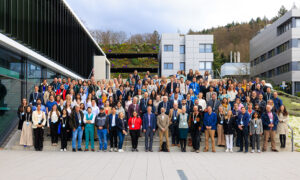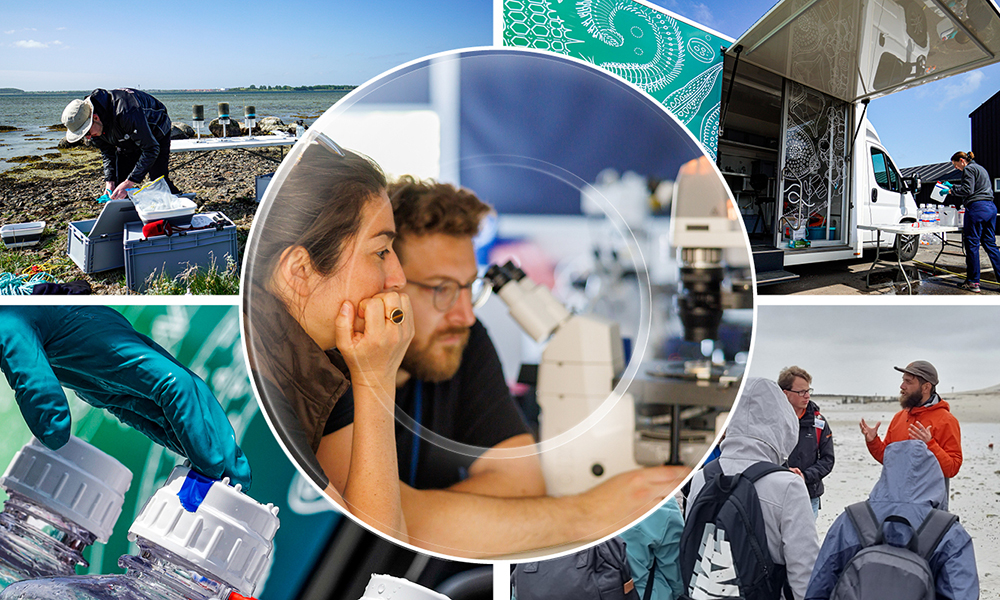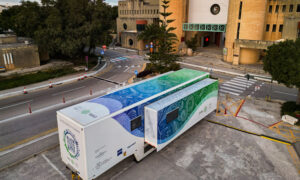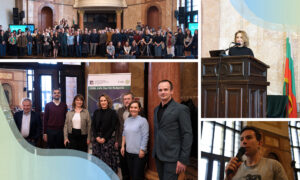
TREC on Twitter: a life-in-context journey through the social media lens
EMBL's latest expedition set sail to study coastal ecosystems and their response to the environment, from molecules to ecosystems. Here's a glance at the TREC journey so far, as told by the teams on the ground.

Exploring coastal life from molecules to ecosystems and measuring human impact at the pan-European scale can help us find solutions to many pressing global problems. TREC – Traversing European Coastlines – is the first Europe-wide scientific expedition that aims to analyse life at land-sea transects from 120 coastal sites across the continent and across a range of biological scales.
Since the scientific expedition kicked off in March, a crew of scientists, outreach specialists, and a vital support team have been on the road, surveying the coasts of France, Belgium, The Netherlands, Germany, and Denmark, and engaging with the local scientific community and citizens. They’ve also been sharing their work and life on the road through social media. Here is an inside look at five main aspects of the mission, as captured in tweets by the expedition team.
Fostering collaboration
TREC combines collaborators’ varied scientific expertise with that from many partner institutions along the way, as the tweets below demonstrate. For a total of one and a half years, the expedition will move along European coasts to explore the land-sea interface, while collaborating with more than 70 institutions.
This is the real face of #TREC. Sailors from @TaraOcean_ , sampling teams from @embl, many scientific collaborators and the Advanced Mobile Labs. So much motivation & smiles in this picture, a tribute to all the hard work those teams have put together to make this happen 1/n pic.twitter.com/XYOzGZ1nNX
— Flora Vincent (@vincentflora) April 6, 2023
Just back from an incredible few days with #EMBLtrec at the stunning & historic @SBRoscoff – hugely grateful to our hosts, our #WeFreezeOnTheBeach friends and the entire @EMBLtrec team for making this possible 1/2 https://t.co/Uvn8SNkenz pic.twitter.com/4COkAmvXhh
— Gautam Dey (@Dey_Gautam) April 6, 2023
High-tech tools in the field
TREC brings cutting-edge scientific technologies into the field. This is possible thanks to new EMBL mobile laboratories and services, which give on-site support to the expedition by providing state-of-the-art technology for sample processing and metadata acquisition.
Its a wrap for the #Plankton & #PlanExM teams at the @EMBLtrec 1st Stop – #Roscoff.
— Omaya Dudin🍉¦ 🦠¦🔬¦ (@dudin_o) April 8, 2023
A big thanks to the @embl Advanced mobile labs for bringing such cutting edge equipment as close as possible to the planktons we adore! pic.twitter.com/eRXXtMKlhG
Its a wrap for the #Plankton & #PlanExM teams at the @EMBLtrec 1st Stop – #Roscoff.
— Omaya Dudin🍉¦ 🦠¦🔬¦ (@dudin_o) April 8, 2023
A big thanks to the @embl Advanced mobile labs for bringing such cutting edge equipment as close as possible to the planktons we adore! pic.twitter.com/eRXXtMKlhG
Sampling across European coasts
After several years of planning, preparation, and discussions, TREC expedition members started collecting the first samples in March this year.
Glad to be part of the amazing @EMBLtrec sampling team. We collect samples of soil, aerosol, shallow water and sediment aiming to learn more about microbial life at the land-sea intersect of the European coastline. Recently Belgium @VLIZnews and Netherlands @NIOZatSea#TREC#EMBL pic.twitter.com/wuNeF5lG8l
— Jonas Richter (@_jonas_richter) May 2, 2023
Some more #teamwork happening to quantify #primaryproduction and #nitrogenfixation, among many other parameters, across a #land2seatransect! @SznDohrn @SBRoscoff #EMBLtrec #BIOcean5D #MarineSymbiomes @NEREAObservato1 pic.twitter.com/VcUzgcbPbU
— Ulisse Cardini (@symbiostoic) April 7, 2023
Making connections and sharing science
The TREC stops also include different activities for the local public. They can join engaging programmes and activities, ranging from conferences and scientific workshops to games and exhibitions. Everybody is invited to experience how molecular biology can help find innovative solutions to protect the health of our planet.
If you are living at the European coast, there is a chance the TREC science expedition is coming your way. Check out the link below for any of our activities you can join! #EMBLTrec https://t.co/tABEoRIi8y
— EMBL Science Education & Public Engagement (@ELLS_Heidelberg) May 9, 2023
The exploration continues
The TREC expedition set sail with its first samplings in Roscoff, France, in the spring of 2023, and is set to conclude its voyage in Malta by mid-2024, nearly 18 months on the road – and at sea. At this time, the expedition carries forward to the shores of the next European country: Germany.
Saying good-bye to wonderful Denmark today! 🇩🇰
— EMBLtrec (@EMBLtrec) June 2, 2023
Next stop: Rostock region in Germany. 🇩🇪
Can´t wait to meet and work with our collaboration partners from the Leibniz Institute for Baltic Sea Research Warnemünde (IOW)! @Ostseeforschung
📸: @ValerieMaier6/ EMBL pic.twitter.com/v8tvO9KJU4
EMBL’s new planetary biology flagship project’s scope is to reach a new and deeper understanding of coastal ecosystems and their responses to changing environments, from molecules to ecosystems. With this collective effort, TREC is currently documenting, examining, and probing coastal ecosystems at the molecular level, on land and by sea, in real time across Europe.
Through this highly collaborative expedition, it will be possible to enhance our understanding of ecosystem responses to both natural and human-induced challenges. By doing so, TREC will provide new knowledge and insights, enabling us to better anticipate the potential consequences of environmental changes and impacts.
The TREC team continues to capture their journey through the social media lens, allowing each and every one of us to take a small step into their shoes, one tweet at a time.
Stay tuned and follow @EMBLtrec on Twitter to keep up with the TREC expedition!


